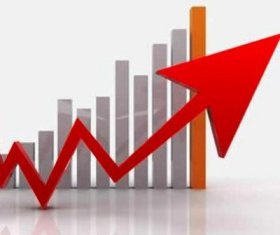Consumer inflation soared to 10.6 percent in April, the highest in almost three years, raising expectations that the Bank of Ghana (BoG) will keep its policy rate on hold for the fourth consecutive meeting next week.
The rate picked up from 10.4 percent in March and comes on the heels of a weak exchange rate since the beginning of the second quarter as importers and companies increased their demand for dollars to buy goods and repatriate profits to shareholders. On month-on-month basis, inflation rose by 0.1 percentage points to 1.8 percent in April.
Food inflation, which hitherto had kept inflation within a more comfortable range, jumped to 6.4 percent in April from 5.5 percent in March, said Baah Wadieh, acting Deputy Government Statistician, at a press briefing in Accra. Non-food inflation however slipped to 13 percent from 13.2 percent in the period.
The BoG has continued to implement tight monetary policies since the cedi weakened by 17.5 percent against the dollar in the first half of 2012. Its measures to stabilise the currency, such as boosting yields on Government-issued debt, will not be relaxed, said Governor Henry Kofi Wampah.
“The bank will assess the macroeconomic situation during its next monetary-policy committee meeting,” he said. “Based on the outcome we will determine if there is the need for any additional measures.”
The International Monetary Fund (IMF) has urged the BoG to maintain a tight monetary policy stance in the face of rising inflation expectations and upside risks from the sharp increase in Government borrowing. The BoG has kept its policy rate at 15 percent since June 2012.
Ghana’s budget deficit climbed to 12 percent of GDP last year due to a combination of revenue shortfalls and expenditure overruns. The gap will be narrowed to 9 percent this year and 6 percent in the medium-term, Dr. Wampah said.
The credibility of these targets should encourage international investor participation in Ghana’s second Eurobond this year, which is seeking to mobilise around US$1billion to refinance some of the government’s debts and build critical infrastructure, he added.
The bond is likely to be sold at a lower interest rate than the 8.5 percent on the first 10-year issue in 2007. Part of the proceeds from the upcoming bond may be used to refinance the 2007 debt, Dr. Wampah said.
By Leslie Dwight MENSAH
Business News of Friday, 17 May 2013
Source: B&FT
Inflation at 3-year high, BoG to keep rate on hold













